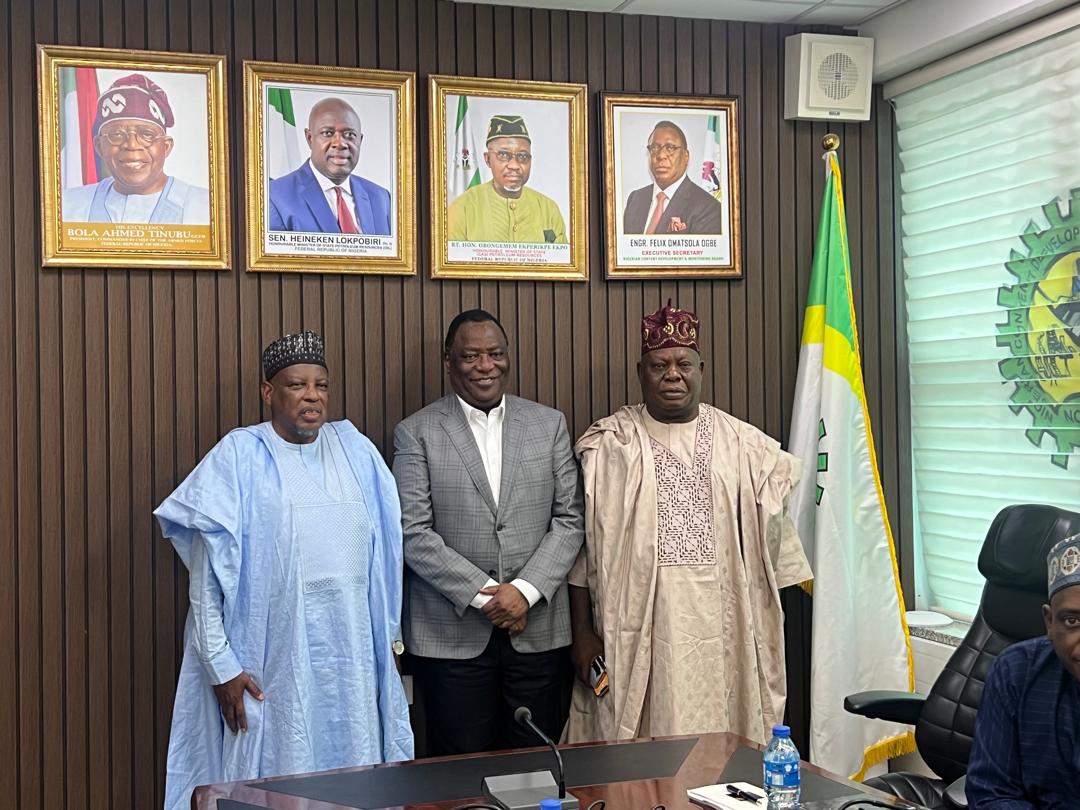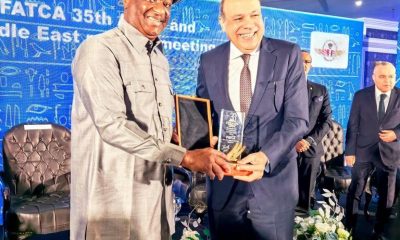EDUCATION
NCDMB, UBEC Explore Opportunities For Capacity Building, Support For Basic Education

The Nigerian Content Development and Monitoring Board (NCDMB) and the Universal Basic Education Commission (UBEC) have agreed to work together to improve basic education in the country and build the capacity of young Nigerians to meet the needs of the ever-changing oil and gas industry and related sectors.
On Tuesday, the Executive Secretary of the NCDMB, Engr. Felix Omatsola Ogbe, met with his UBEC counterpart, Dr. Hamid Bobboyi, at the Board’s Abuja liaison office to discuss partnership opportunities. The leaders agreed to form a joint committee to finalise the details of their agencies’ collaboration, with the ultimate goal of making a significant contribution to Nigeria’s economic future.
The meeting between top management from NCDMB and UBEC focused on upgrading dilapidated primary and junior secondary schools, training teachers, and upgrading critical facilities to meet current demands. Conversations also centred on making basic education more sustainable, developing digital resource centres and smart school systems, and coordinating the efforts of education stakeholders for maximum impact.
Before this engagement, NCDMB had established over 150 ICT centres in secondary schools across the country, upgraded select technical colleges, and intervened in some universities as part of its institutional strengthening program, which was funded by international and indigenous oil companies.
In his remarks, the NCDMB Executive Secretary announced the launch of a bespoke capacity-building project dubbed “Back to the Creeks/Villages.” The initiative would aim to renovate dilapidated primary schools, particularly in the Niger Delta’s creeks and other parts of the country, by upgrading their infrastructure, teaching personnel, and curriculum to world-class standards and making the interventions sustainable.
Ogbe expressed his desire to contribute to the development of Nigeria’s remote areas and stated that he had begun discussions with some international oil companies. He hopes that the oil companies will support the initiative and allocate their human capacity development (HCD) budgets to the new program for mutual benefit.
He emphasised the strategic importance of beginning at the basic education level to develop young Nigerians’ capacities, rather than intervening at the senior secondary or tertiary level.
The Executive Secretary stated that the detailed strategy for the “Back to the Creeks/Villages” was still being finalised and would be revealed to industry stakeholders soon.
He assured the UBEC boss that NCDMB would collaborate with the agency, beginning with teacher training and that the success of the collaboration would entice other entities to join forces with UBEC.
He emphasised the importance of developing comprehensive project scopes and making every intervention sustainable. This can be accomplished, he explained, by intentionally allowing the benefiting communities to take ownership of the projects.
Earlier in his remarks, UBEC’s Executive Secretary suggested that NCDMB collaborate with the agency to develop, equip, and operate Digital Resources Centres and Smart School Solutions in the Federation’s states.
The UBEC boss lamented the embarrassing state of basic educational institutions across the country, remarking that a nation that neglected primary education had invariably embraced a bleak economic future and a dysfunctional society.
He lamented several challenges to the country’s basic education development, including an insufficient budget and a lack of interest on the part of some state governors. Among other issues. He emphasised the importance of collaborating with stakeholders to leverage additional resources for the sub-sector.
In their contributions, Dr Ama Ikuru, Director of Corporate Services at NCDMB, stated that NCDMB’s interventions in schools and other learning institutions over the last 14 years were in support of the organization’s mandate of developing the necessary capacities for Nigeria’s oil and gas industry and linkage sectors.
Similarly, Mr. Abdulmalik Halilu, Director of Monitoring and Evaluation, advised that the Board’s collaboration with UBEC should be guided by four pillars: needs assessment, sustainability plans, execution enablers, and the identification of funding sources.
-
CRIME3 years ago
PSC Dismisses DCP Abba Kyari, To Be Prosecuted Over Alleged $1.1m Fraud
-
FEATURED3 years ago
2022 Will Brighten Possibility Of Osinbajo Presidency, Says TPP
-
FEATURED2 years ago
Buhari’s Ministers, CEOs Should Be Held Accountable Along With Emefiele, Says Timi Frank
-
BUSINESS & ECONOMY1 year ago
Oyedemi Reigns As 2023’s Real Estate Humanitarian Of The Year
-
SPORTS1 year ago
BREAKING: Jürgen Klopp Quits Liverpool As Manager At End Of Season
-
SPORTS2 years ago
Could Liverpool Afford Kylian Mbappe For €200 million? Wages, Transfer Fee
-
ENTERTAINMENT2 years ago
Veteran Nigerian Musician, Basil Akalonu Dies At 72
-
FEATURED2 years ago
Tribunal Judgement: Peter Obi Warns Of Vanishing Electoral Jurisprudence, Heads To Supreme Court
-
BUSINESS & ECONOMY2 years ago
Oyedemi Bags ‘Next Bulls Award’ As BusinessDay Celebrates Top 25 CEOs/ Business Leaders
-
FEATURED3 years ago
2023 Presidency: South East PDP Aspirants Unite, Demand Party Ticket For Zone



































